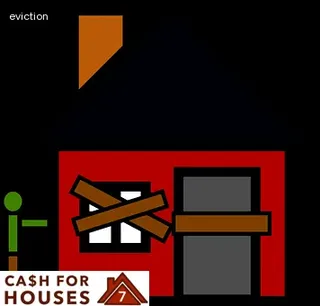In the state of Kansas, landlords are obligated to follow strict laws when dealing with abandoned property. Under the Kansas Landlord-Tenant Code, tenants who fail to pay their rent for a month or more and who leave without giving notice are considered to have abandoned their rental unit.
The landlord must then go through a step-by-step process in order to secure and protect the property. This includes publishing a notice of abandonment in a newspaper, filing an affidavit with the court, and sending certified letters to the tenant's last known address.
Once all of these steps have been completed, the landlord may proceed with re-renting or disposing of the abandoned property according to state regulations. Additionally, landlords are required to make reasonable efforts to preserve any personal property left behind by the tenant and must provide them with an itemized list if they request one.
Knowing and following these laws is essential for landlords in Kansas who wish to ensure that they comply with local statutes regarding tenant abandonment.

When dealing with tenant abandonment in Kansas real estate, it's important to understand how to handle the personal property of the tenant. In most cases, you'll need to take steps such as inspecting the property, determining its ownership, storing it and disposing of it accordingly.
First off, you must inspect all personal items left behind by the tenant. Make sure that all hazardous materials are safely removed and that any perishable items are disposed of immediately.
Then, determine if the property left behind is owned by the tenant or is part of the rental property itself. If there's any doubt about ownership, contact the tenant or their representatives for clarification.
Once you've determined who owns what, store any items that still belong to the tenant in a secure location for a certain period of time according to state laws before disposing of them appropriately.
When a tenant unexpectedly leaves the rental property, landlords in Kansas must take certain steps to resolve the situation. First, they should determine whether the tenant abandoned the property or if there is another explanation for their absence.
Landlords may need to look for signs such as whether rent payments have been made on time or if furniture and other personal items have been removed from the premises. It is important for landlords to review the terms of their lease agreement and consult with an attorney for legal advice before taking any action.
Once it has been determined that a tenant has abandoned their rental unit, it is critical for landlords to follow applicable laws when securing and disposing of the tenant’s possessions. Furthermore, some states require landlords to make an effort to contact the tenant and provide proper notification of their intention to reclaim possession of the unit.
Finally, landlords must properly document all expenses incurred while resolving this issue and keep records in case of any future disputes.

When dealing with tenant abandonment in Kansas real estate, it is important to keep security deposit return regulations top of mind. Kansas law dictates that if a tenant vacates a rental property prior to the end of their lease without giving proper notice, landlords have 30 days to refund the security deposit.
Landlords must also provide tenants with an itemized list of charges for any deductions from the security deposit and proof that these deductions are reasonable and necessary. If a landlord fails to provide this information within the allotted time frame, they forfeit their right to withhold any money from the security deposit.
Additionally, if landlords fail to return a tenant’s security deposit or respond to their complaints about the returned amount within 30 days, tenants may be entitled to double the amount of their original security deposit as compensation. Therefore, it is essential for landlords to familiarize themselves with these rules and regulations in order to ensure compliance when resolving tenant abandonment issues in Kansas real estate.
In Kansas, there are specific exceptions to the abandoned property laws that must be taken into consideration when resolving tenant abandonment. Landlords with tenants who have abandoned a property before the end of their lease terms must understand these exceptions in order to ensure they remain compliant and protect their rights as a landlord.
One exception is that if the tenant has given proper written notice of termination and continued to pay rent until the termination date, then the landlord cannot enter and take possession of the rental unit for any purpose whatsoever without first obtaining a court order. Another exception is that if a tenant abandons a rental unit due to an act or omission of a public official or utility company which renders the rental unit uninhabitable, then the tenant will not be liable for any rent incurred after such an act or omission occurred.
Finally, if the tenant has abandoned property in accordance with applicable state law, then the landlord may dispose of it without incurring liability. It is important for landlords to be aware of these exceptions when dealing with tenant abandonment cases in Kansas real estate.

When dealing with tenant abandonment in Kansas real estate, it is important to be aware of the differences between state regulations. In Kansas, a landlord must provide written notice of abandonment and file a Petition for Possession with the court before they can legally reclaim their property.
Furthermore, if the tenant has left personal possessions behind, the landlord must also provide written notice to the tenant allowing them 14 days to retrieve their items. It is critical that landlords understand their rights and obligations under the law when attempting to resolve tenant abandonment in order to avoid legal repercussions.
Each state has its own set of laws governing how landlords can handle abandoned property; therefore, it is essential for anyone dealing with this issue in Kansas to be familiar with the specific regulations and requirements.
When it comes to resolving tenant abandonment in Kansas real estate, it's important to familiarize yourself with your state's laws. Knowing the legalities of eviction and tenant abandonment can help you understand your rights as a landlord or property manager.
To find out what the laws are in Kansas, start by visiting the website of the Kansas Department of Commerce. This site includes specific information about landlord-tenant law, including topics like lease agreements and eviction proceedings.
You can also contact your local court for assistance in understanding the relevant statutes and regulations. Additionally, there are many resources available online that provide step-by-step guidance on how to handle tenant abandonment in Kansas real estate.
Researching these resources can be invaluable when navigating through the complexities of landlord-tenant law in Kansas.

When it comes to tenant abandonment in Kansas real estate, property managers must have a thorough understanding of why the tenant left. This is critical in order to avoid similar circumstances in the future and to ensure that the property can be quickly filled with a new tenant.
Several factors may contribute to a tenant's decision to leave, such as inadequate housing conditions or disputes between landlord and tenant. Additionally, if rent is not paid on time or if the rental agreement is breached, this could result in a tenant abandoning their home without notice.
Another potential reason for leaving might include job relocation or personal life changes. By exploring each potential cause and addressing any underlying issues, property managers can create an effective plan for resolving tenant abandonment while protecting their investment.
As a tenant in Kansas real estate, it is important to understand your rights and responsibilities when it comes to resolving tenant abandonment. If you are facing an issue with a tenant who has vacated the property without notifying you, there are steps that must be taken to ensure that the process of resolving tenant abandonment goes as smoothly as possible.
The first step is to review your rental agreement or lease and become familiar with any relevant clauses regarding tenant abandonment. This will help you determine what actions are necessary and allowed under the terms of the agreement.
You should also make sure that all notices regarding termination of tenancy have been sent out to the tenant's last known address. Additionally, it is important to document any attempts made at collecting rent or attempting contact with the tenant, as these can be used in court should legal action be necessary.
Finally, if feasible, try to inspect the property for any evidence of abandonment before taking further steps. Taking these steps can help protect both you and your property from unnecessary harm during this difficult time.

When it comes to tenants and landlords navigating housing discrimination and eviction issues in Kansas real estate, having a step-by-step guide to resolving tenant abandonment can make the process much smoother. Landlords must be aware of the law when addressing potential housing discrimination, as this could result in legal penalties.
The Fair Housing Act protects tenants from being discriminated against based on race, color, religion, sex, familial status or national origin. Eviction decisions should not be based on any of these characteristics either.
Additionally, landlords should ensure that they are familiar with all relevant state laws when dealing with tenancy abandonment matters. They must adhere to specific timelines for notice and process requirements in order to properly terminate a lease agreement without getting into any legal trouble.
Tenants also need to understand their rights when it comes to eviction and any other disputes that may arise between landlord and tenant. By researching your rights under the law, as well as understanding what steps are necessary for resolving tenancy abandonment issues, both parties can have peace of mind knowing they are handling the situation correctly.
When it comes to tenant abandonment in Kansas real estate, there are a few legal proceedings that landlords must be aware of before proceeding. First, the landlord needs to deliver the Notice of Intent to Vacate to the tenant, giving them ample time to move out and return the keys.
The second step is for the landlord to file an Unlawful Detainer Suit with their county court. This is done if the tenant does not respond or vacate after receiving notice and sets forth a court date.
Security deposits also play an important role in tenant abandonment cases as they can cover any unpaid rent or property damage left by the tenant. Landlords should review state laws for specific regulations on security deposits and how long it may take to receive them back from tenants.
Understanding all of these legal proceedings involved in moving out and security deposits is essential when dealing with tenant abandonment in Kansas real estate.

When it comes to Kansas real estate, tenant abandonment can be a difficult situation to manage. Thankfully, there is a step-by-step guide available to help landlords and property owners understand how to properly handle this situation.
First, start by understanding the legal definition of tenant abandonment. This will help you determine if your tenant has actually abandoned the property or if they are still legally occupying the space in some capacity.
Next, review your lease agreement to see what provisions have been made for tenant abandonment. You should also document any evidence of abandonment, such as unpaid rent or utilities and missing personal belongings.
Once you have proof of abandonment, you must then file an eviction notice with the court system and serve it to the tenant's last known address. From there, wait for a response from the tenant before taking further action.
Finally, if all else fails, you may need to pursue repossession of the property through legal means so that you can regain control of it and prepare it for new tenants or another use. With this step-by-step guide in hand, resolving Tenant Abandonment in Kansas Real Estate should be much easier!.
Before signing a lease for any Kansas real estate, it’s important to understand the rules and regulations of landlord-tenant law. This step-by-step guide will help you learn how to resolve tenant abandonment issues should they arise.
First, know that in accordance with state law, tenants are required to provide written notice of their intention to vacate the property within the specified timeframe outlined in their lease agreement. If the tenant fails to do so, they may be subject to eviction proceedings.
Second, landlords must document all attempts to contact their tenants including certified mail, email or phone calls. Third, take inventory of the property and make sure no personal belongings have been left behind by former tenants as these may need to be disposed of according to local laws and regulations.
Fourth, notify local police if there is evidence of vandalism or damage beyond ordinary wear and tear on the premises before contacting another tenant. Fifth, review your lease agreement to ensure it includes a clause regarding tenant abandonment and that all parties involved have clearly understood its terms and conditions.
Finally, consider hiring a third-party mediator or attorney if needed in order to protect your interests as a landlord during negotiations with tenants over unpaid rent or other damages caused by them during the tenancy period. Following these steps will ensure that you receive fair treatment from both sides when dealing with tenant abandonment in Kansas real estate.

When it comes to landlord-tenant relationships, there are many questions that come up regarding rights and responsibilities. In Kansas, landlords usually have the right to enter a rental property in an emergency situation or with prior written notice.
Tenants also have certain rights including being able to enjoy the premises without interference from the landlord. Landlords must provide tenants with safe and habitable housing, as well as maintenance and repairs when needed.
Tenants are expected to pay rent on time and follow all of the terms outlined in the lease agreement. When dealing with tenant abandonment in Kansas, landlords should first understand their local laws before taking any action.
They can also consult their state's real estate commission for guidance on how to resolve the issue step by step.
Hiring a landlord-tenant attorney is the best way to protect yourself when dealing with tenant abandonment in Kansas real estate. An experienced lawyer can help you understand and comply with the state's laws and regulations, ensuring that your rights are protected throughout the entire process.
They can provide advice on the necessary steps to legally evict a tenant, as well as advise on dispute resolution options such as mediation or negotiation. Additionally, they can draft documents such as notices of eviction, leases agreements, and other legal documents related to tenant abandonment.
When hiring an attorney, it's important to consider their experience in landlord-tenant law and also make sure they have a good reputation amongst colleagues in the industry. Ultimately, having an experienced professional on your side will give you peace of mind that you are taking all necessary steps to resolve any tenant abandonment issues quickly and efficiently.

When trying to resolve a tenant abandonment issue in Kansas real estate, it is important to keep the dispute resolution process efficient and effective. This will help avoid any legal trouble and strengthen your relationships with tenants.
A step-by-step guide to resolving this kind of problem can help landlords understand their rights, responsibilities, and potential remedies available. To start, landlords should document all communication with the tenant and keep detailed records of rental payments.
It's also important to review the applicable state laws to ensure compliance and familiarize yourself with your rights as a landlord. The next step involves communicating with the tenant and providing them with written notice of their breach of contract or failure to pay rent; if they still fail to comply, landlords may need to contact a lawyer for assistance.
Finally, if the tenant has left without paying rent or left property behind, landlords must take steps such as repossessing or disposing of the property appropriately. Adhering to these steps can provide an effective solution for avoiding trouble when dealing with tenant abandonment in Kansas real estate.
If you are a tenant in Kansas real estate, it is important to understand your rights and responsibilities when it comes to resolving tenant abandonment. As a tenant, you have the right to know how much notice needs to be given if you decide to move out and how your security deposit will be handled.
On the other hand, as a landlord, you have the responsibility of making sure that any abandoned property is removed from the premises in a timely manner. To create a positive relationship with your landlord, both parties should be aware of their rights and responsibilities regarding tenant abandonment.
Knowing what steps need to be taken if a tenant decides to vacate the property can help ensure that all parties are on the same page and can provide protection for both tenants and landlords alike. A step-by-step guide for resolving tenant abandonment in Kansas real estate can provide helpful information on topics such as finding an alternate solution for tenancy problems, proper lease termination procedures, and ensuring compliance with state laws.
By understanding your rights and obligations in regards to tenant abandonment, you can create a positive relationship with your landlord while also protecting yourself from potential legal issues down the road.

One of the most important steps in resolving tenant abandonment in Kansas real estate is negotiating a fair rental agreement. Before entering into any kind of agreement, it is essential to understand the laws surrounding tenant rights and landlord obligations in Kansas.
Both parties should also be aware that tenant abandonment can lead to significant legal consequences if not handled correctly. To ensure a successful negotiation process, it is important to familiarize yourself with your state’s rental laws and regulations, as well as the specific terms of your rental agreement.
Additionally, research potential conflict resolution techniques that may be useful during negotiations. When negotiating a fair rental agreement, both parties should consider key factors such as rent rate, security deposits, rent increases or decreases over time, maintenance and repair responsibilities, pet policies and other topics related to the rental arrangement.
Make sure all aspects of the agreement are thoroughly discussed before signing any contracts. Finally, remember that both parties should feel comfortable with their decisions before committing to an agreement; this will help ensure that tenant abandonment issues do not arise in the future.
Managing tenant move ins and outs successfully is key to resolving tenant abandonment in Kansas real estate. To ensure that property managers, landlords, and tenants alike are on the same page about expectations, it is important to have a clear step-by-step process for managing tenants.
Establishing a checklist for each step of the process from move-in to move-out will help to avoid any confusion or unforeseen circumstances that may arise. This guide should include items such as conducting walkthroughs upon move in and out, collecting security deposits, having a detailed lease agreement in place that outlines rental policies and expectations, and making sure all paperwork is filled out correctly.
Additionally, having an inventory of all appliances and furniture provided by the landlord can be beneficial if there are any disputes over damages at the end of the tenancy period. By taking these steps before renting out property in Kansas real estate, landlords can avoid issues with tenant abandonment while also providing peace of mind for both parties involved.
In Kansas, a tenant's property is considered abandoned if the tenant has been absent from the rental property for more than 10 days without providing written notice to the landlord.
Additionally, if rent is unpaid for more than 10 days, it will be assumed that the tenant has abandoned the rental property and all of their possessions.
As a result, landlords must be aware of how long before their tenants' properties are considered abandoned so that they can take appropriate steps to resolve any issues that may arise from tenant abandonment in Kansas real estate.

The Kansas Abandonment Law outlines several steps that landlords must take in order to resolve a tenant abandonment situation. Under the Kansas Abandonment Law, if a tenant has vacated their rental property without giving proper notice or paying rent, the landlord must first give written notice to the tenant's last known address.
This notice must include information about the amount of rent due, instructions to contact the landlord and a warning that failure to do so will result in eviction proceedings. If there is no response from the tenant within 7 days, then the landlord may consider the tenancy abandoned.
At this point, the landlord is required by law to take an inventory of all personal property left in the rental property and make reasonable efforts to store it for 15 days before disposing of it. The landlord is also required to pursue any unpaid rent due through legal channels before disposing of any personal property belonging to the tenant.
Finally, if applicable, Kansas law requires that tenants receive any remaining security deposit funds within 30 days of their tenancy ending regardless of abandonment status.
In Kansas, a tenant can withhold rent if the landlord has failed to provide vital services or amenities of the rental such as heat, running water, or electricity.
In extreme cases, when the landlord has not remedied these issues within 10 days of being notified by the tenant, then the tenant may be able to terminate their lease agreement and withhold rent.
For more information on resolving tenant abandonment in Kansas Real Estate, a step-by-step guide is provided below.
If you are a tenant in Kansas and believe that your landlord has abandoned you, it is important to know how to report them. In order to file a formal complaint against a landlord or rental property owner, there are several steps you should take.
First, contact the Kansas Department of Housing and Urban Development (KDHU) for assistance. They can provide advice on the legal requirements for filing an official complaint and can also help identify any potential violations of the law.
Second, compile evidence of abandonment including photos, emails, or other proof that the landlord is not living up to their responsibilities. Third, submit a written complaint with all supporting documents to KDHU via email or post.
Fourth, be prepared for potential follow-up questions from KDHU staff about your case. Finally, if an investigation reveals a violation of state law by the landlord then appropriate action will be taken such as fines or even eviction proceedings.
Taking these steps will ensure that your rights as a tenant are protected and that justice is served in cases of tenant abandonment in Kansas real estate.
A: The landlord should take steps to re-rent the property, either by subleasing or converting to a month-to-month agreement. If successful, any remaining rent payments due under the original lease will be paid by the new tenant.
A: First, review Kansas tenant laws to ensure you are following all applicable regulations. Then, notify the tenant of their abandonment and secure the property. Finally, file an eviction notice with the local court to officially terminate the tenancy agreement.
A: If a tenant abandons property in Kansas, the landlord should review the lease agreement to determine the terms for abandonment and any relevant information about security deposits, rent collection, and eviction notices. Depending on the terms of the agreement, the landlord may need to serve an eviction notice or take other legal steps to protect their rights.
A: If a tenant abandons their rental property in Kansas, the landlord should contact an experienced attorney to ensure they are following all local and state laws. The attorney can help you navigate the process of recovering any unpaid rent, as well as repossessing the property and re-leasing it.
A: The first step is to provide written notice to the tenant that states their rent is overdue and they have a certain amount of time to pay it or vacate the property. If the tenant does not respond, you can then file an eviction action with the district court. After filing, you will need to serve a copy of the summons and petition on the tenant and wait for them to file an answer. If no answer is received, you can request a default judgment from the court. Once granted, you must hire a constable or sheriff to physically remove the tenant from your property.
A: According to K.S.A., an organization should seek restitution from the tenant and any secured creditors with whom the tenant has contracted for the payment of rent or other obligations related to the property.
A: To advertise for a new tenant in the event of property abandonment in Kansas, you should consider placing an ad in local newspapers, newsletters and/or contacting law firms.
A: You can start by filing a claim for the amount of unpaid rent and damages with the court. If the court grants the judgment in your favor, you should then take steps to collect on it. This could include garnishing wages or placing a lien on the tenant's property.
A: The landlord should contact the creditor to inform them of the abandonment and take steps to secure the property. They should also publish a notice of their claim in a newspaper of general circulation.